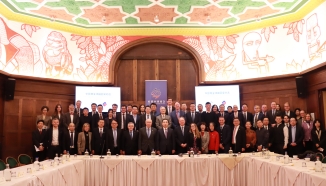Euractiv: Chinese and American firms denounce Brussels' push to favour EU firms
The EU's legal case for discriminating against Chinese firms is likely stronger than it is against US firms, experts say
Chinese and American industry groups have condemned the European Commission's proposal to favour EU companies bidding for public contracts, arguing it would be discriminatory and hamper the bloc's efforts to decarbonise its economy.
The EU executive's much-vaunted Clean Industrial Deal, released on Wednesday, states that "European preference criteria" in "strategic sectors" will be included in a revision of the bloc's Public Procurement Framework next year.
A spokesperson for the China Chamber of Commerce to the EU (CCCEU) told Euractiv that Brussels' proposal risks violating World Trade Organization (WTO) rules prohibiting discrimination against foreign firms.
They also warned it could exacerbate already fraught trade relations between Brussels and Beijing.
"As China is a key player in many strategic sectors, these preferences could place Chinese firms at a disadvantage, escalating trade tensions and potentially violating WTO principles," the spokesperson said.
The American Chamber of Commerce to the EU (AmCham EU) similarly noted that it was "concerned" about the Commission's proposal.
"Restricting access for trusted partners would slow down industrial decarbonisation, increase costs and reduce the efficiency of the clean transition," AmCham EU said, adding that the Deal nevertheless represents "an important contribution" to the EU's decarbonisation efforts.
The EU's legal argument for discriminating against Chinese firms is likely stronger than its case against US firms, given that the EU and the US are signatories to the WTO's Agreement on Government Procurement (GPA) while China is not, one expert said.
"If the EU applies the European preference principle to exclude the US, then you'll have an issue with the US," said Victor Crochet, a partner at Nishimura & Asahi. "But if it excludes China, there's nothing wrong."
Crochet added that Beijing is likewise entitled to discriminate against EU firms – and pointed out that the Commission itself recently accusedChina of unfairly favouring its own medical device suppliers.
"China's not violating international law by discriminating in its own public procurement," he said.
The revision of the Public Procurement Framework is not the only legislative change proposed by the Commission that will favour EU firms over the coming years.
Although not included in the Deal itself, an accompanying Commission press releasepublished on Wednesday stated that "made-in-Europe criteria" in both private and public procurement will be included in the upcoming Industrial Decarbonisation Accelerator Act.
The Act, which aims to boost domestic demand for EU green technologies, is expected to be formally proposed in the final three months of this year. "Where the product is produced will be relevant," an EU official told Euractiv, referring to the Act.

 Login
Login Login
Login CCCEU Launches Automotive Working Group in Lisbon | 2025 Portugal-China & Europe-China Cooperation Development Forum Successfully Held
CCCEU Launches Automotive Working Group in Lisbon | 2025 Portugal-China & Europe-China Cooperation Development Forum Successfully Held CCCEU, EUCCC Host 3rd EU-China Business Leaders Roundtable Dialogue
CCCEU, EUCCC Host 3rd EU-China Business Leaders Roundtable Dialogue



